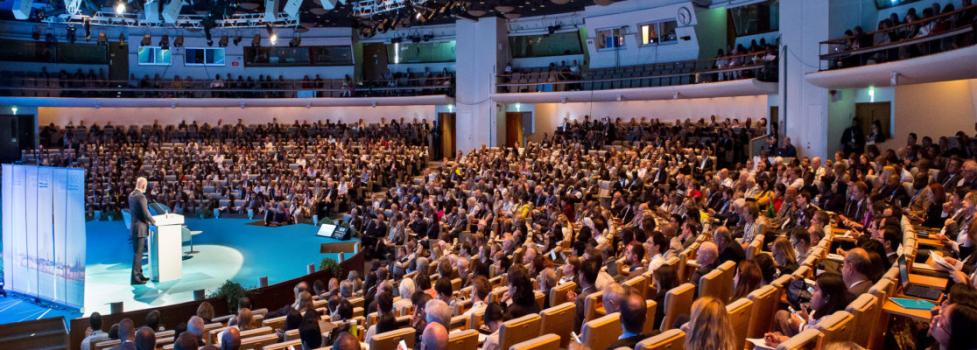It’s 4:00 p.m. on Thursday, August 31, in Stockholm, Sweden. For five days now, the halls of the Stockholm City Conference Centre have been humming with the impassioned discussions of more than 3,200 water experts, decision-makers, private sector representatives and thought leaders. They’ve gathered here from over 130 countries for World Water Week, the largest annual conference of its kind in the world. Here at the end of the week, amid hundreds of panels, presentations and plenaries, the Sustainable Water Partnership (SWP) is hoping to make a splash.
While most sessions at this year’s conference, themed “Water and Waste: Reduce and Reuse,” focused on issues related to WASH (Water, Sanitation and Hygiene), SWP’s Thursday showcase took a broader view. In his opening presentation, SWP Director Eric Viala emphasized water’s necessity not only for health, but also for food, livelihoods, energy, economic activities and socioeconomic growth.
“SWP is about the bigger picture,” Viala says. “Water is a very complicated issue, and it has to be looked at in a holistic manner. That’s what SWP is trying to bring to the table.”
Following a presentation by Betsy Otto of SWP partner World Resources Institute, Viala was joined by a team of expert panelists to discuss water’s essential role in key development issues. Stockholm International Research Institute’s Dan Smith linked water security to political security, while Lisa Hook of Gap, Inc. and Tara Varghese of PepsiCo, Inc. offered private sector perspectives on water risks. Amit Bando, senior director of Winrock’s Clean Energy and Water Group, explained the reciprocal connections between water, energy and food production.
“Most people need to produce food efficiently, that’s an obvious given. To do so in a better, more productive way, you would need a reliable supply of water,” Bando says. “We’re tying water, energy and food production to people’s ability to be resilient in the face of economic and environmental changes.”
For Viala, the showcase encapsulated a central tenet of SWP’s overall approach to water security, outlined in the first SWP toolkit unveiled at the event. While WASH is important, Viala says it’s “only the first step in socioeconomic development.”
“Once you improve public health with better water and sanitation, then you need to look at the next step,” Viala says. “In socioeconomic development, the next step is having a livelihood. When you’re looking at very poor people in Ethiopia or Sudan, the first thing they need is to drink safe water and to have their sanitation properly managed so that they don’t get sick. But once you’ve done that, the second thing is that they need to eat — and to eat they either need to produce food or have an activity that allows them to generate income and to buy food.”
While World Water Week has come to a close, the showcase event was only one drop in SWP’s bucket. With a four-part series at the Wilson Center in Washington, D.C. beginning September 26, the program will continue to make waves in the world of water security.


